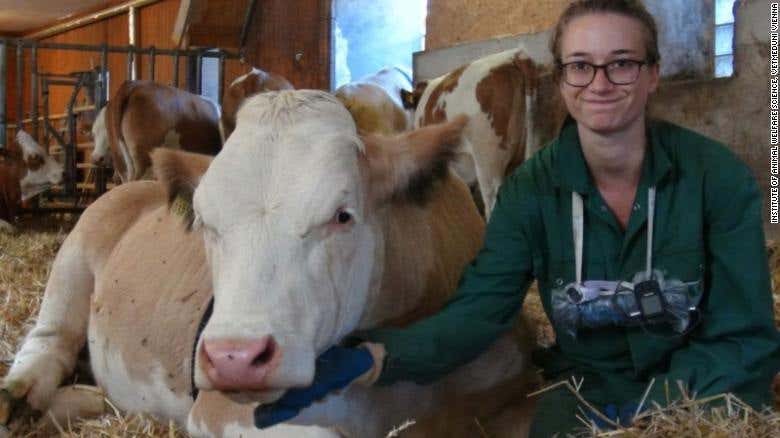Cows prefer to co-moo-nicate in person, research suggests
Cows don’t make video calls but if they did, chances are they’d hate them just as much as most of us do.

[Oct. 15, 2020: Katie Hunt]
Cows don't make video calls but if they did, chances are they'd hate them just as much as most of us do.
The farm animals prefer face-to-face chat, new research from Austria suggests. Cows are more relaxed after being spoken to directly by a live human rather than when listening to a recorded voice via a loudspeaker, researchers found.
"Our study suggests that live talking is more relaxing for our animals than a recording of a human voice," said Annika Lange, a doctoral student at the University of Veterinary Medicine in Vienna and author of the study, in a press statement.
"Interactions may be less positive when they become artificial."
Previous research has shown that cows are quite sophisticated "co-moo-nicators" -- both among themselves and with humans. Scientists have discovered that cows make distinctive sounds when excited, lonely or looking forward to a meal, and they direct low-frequency calls toward their calves.
They're also responsive to human voices. Calves can learn to be called by individual names and have learned to follow specific calls to go to the milking shed. They also seem to show a clear preference for handlers who talk gently rather than shout.
This latest study, published in the journal Frontiers in Psychology, suggests that cows prefer to listen to humans in person.
Working with a herd of 28 heifers, the researchers compared stroking the animals while playing a recording of an experimenter's voice talking soothingly, or stroking them while speaking to the animals directly -- also gently.
"When relaxed and enjoying the interaction, the animals will often stretch out their necks as they do when they groom each other," said Lange.
"Additionally, it is thought that ear positions may indicate mood: hanging ears and low ear positions appear to be linked to relaxation."
The cows' behavior and physiological signs suggested that the animals had a positive reaction to both the recorded and in-person talking. But their heart rates were lower after the animals were spoken to directly -- suggesting that the animals had a more positive experience and were relaxed for longer after live talking.
Lange said the findings could help improve relationships between cattle and humans -- an important aspect of animal welfare. She added that other studies have showed that cows that are less fearful of humans also produce more milk.
"Our hope is that stockpersons or farmers will more often interact gently and speak some nice words when they are working with cattle in the future."
However, the property only appeared at extremely high pressures of 267 billion pascals - about a million times higher than typical tyre pressure. This obviously limits its practical usefulness.
This Brighter Side of News post courtesy of CNN.
Like these kind of stories? Get The Brighter Side of News' newsletter.



